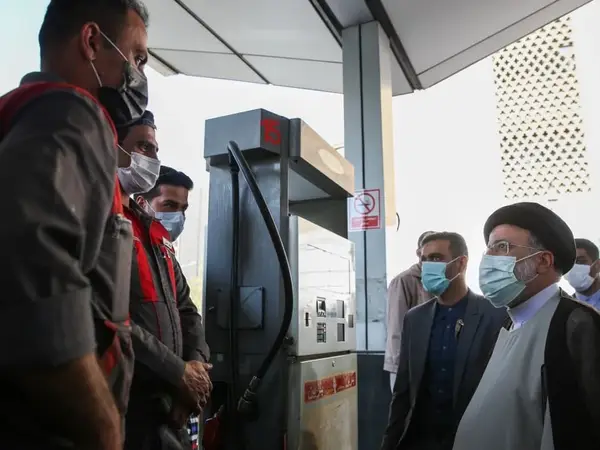A day after an apparent cyber-attack on fuel stations across Iran reformist media warned the government to be transparent over any plans to raise fuel prices.
Authorities soon acknowledged the problem and said people, who had formed long queues to refuel their vehicles, could still buy gasoline but at the unsubsidized rate of 30,000 rials. This only served to deepen suspicions of a secret plan to increase fuel prices.
The reformist Etemad newspaper said the authorities' insistence there were no immediate plans to increase prices could not convince the public.
"The atmosphere of distrust in the announcements and tweets is so strong that at the time of writing this report, Tuesday evening, there are still queues at service stations and more people are rushing there," Etemad opined. "The reason for such distrust is previous [government] behavior regarding increasing fuel prices."
Smart cards are used for buying gasoline, subsidized by the government, at 15,000 rials a liter, around 12 percent of the price in Iraq, 8 percent of the price in Afghanistan, and 7 percent in Turkey.
"Increase in fuel prices in Iran is inevitable but it should be done without the usual denials and retraction…[instead] honestly, transparently and gradually,” Etemad advised. “There will be costs such as what happened in 2019 if previous approaches continue," the paper noted, referring to nation-wide protests under the previous administration when prices were previously increased.
"Occurrence of this incident while already there were rumors about scraping hidden subsidies and the possibility of fuel price increase reinforced the view that the government is planning to scrap subsidized gasoline," the reformist Arman-e Melli newspaper wrote Wednesday.
Following speculation on social media about stringent increase in fuel prices, government officials, including interior minister Ahmad Vahidi, have vehemently denied such plans. Asked by reporters Monday, head of the Planning and Budget Organization Masoud Mir-Kazemi denied there was provision for a hike in fuel prices in next year's budget bill.
Speaking at the cabinet meeting Wednesday morning, President Ebrahim Raisi (Raeesi) said the aim of Tuesday’s disruption at gasoline stations was “to anger people by causing disorder and disruption in their lives." Raisi calling on the oil ministry to avoid any loss in the supply of subsidized fuel.
Authorities initially said the disruption would end by Wednesday but now expect the resumption of all operations at service stations by Thursday. Supplies in around 3,000 service stations stopped as messages of "cyber-attack" appeared on fuel pump monitors that read the smart cards used for purchasing rationed, subsidised gasoline.
Many economists in Iran have long argued against fuel subsidies, which disproportionately benefit the better-off, in favor of targeted payments to the less well-off. Facing a large budget deficit, the government is looking at reform options over such subsidies, including a the elimination of a cheap exchange rate of 42,000 rial dollar, with a market rate at 276,000 allocated for importing goods such as food, medicine, and animal feed.
